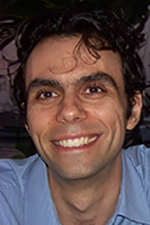2016 Research Seminars
People or Power? Agonistic Democracy and Stasis
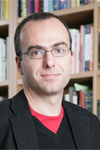
Date and Time: Wednesday, 28 September, 2016. 3.30 pm — 5.00 pm
Location: Bankstown Campus, Building 3, Meeting Room 3.G.54
Speaker
Dimitris Vardoulakis
Abstract
I start with a double premise. First, that there is dissatisfaction with "democracy" as it is actualised today, and, second, that the dissatisfaction with democracy always returns, in one way or another, to how the "people" or "demos" is conceptualised. Can we think of
democracy in a different way? My starting point is to ask what it would mean to take kratos (power) rather than demos as the starting point of the thinking of democracy. I will argue that this is consistent with Solon's first democratic constitution and that it leads to a thinking of democracy in terms
of agonism. My attempt at a definition of agonistic democracy comes from the introduction to my current book project, provisionally titled Stasis: On Agonistic Democracy.
Bio
Dimitris Vardoulakis (Western Sydney University) is the author of The Doppelgänger: Literature's Philosophy (2010), Sovereignty and its Other: Toward the Dejustification of Violence (2013), Freedom from the Free Will: On Kafka's Laughter (2016), and The Ruse of Sovereignty:
Democracy and Stasis (2017). He has also edited or co-edited numerous books, including Spinoza Now (2011) and Sparks Will Fly: Benjamin and Heidegger (2015). He is the director of "Thinking Out Loud: The Sydney Lectures in Philosophy and Society."
Hegel's actualist metaphysics as a framework for understanding his recognition-based account of Christianity
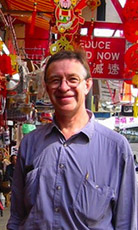
Date and Time: Wednesday, 17 August, 2016. 3.30 pm — 5.00 pm
Location: Bankstown Campus, Building 3, Meeting Room 3.G.54
Speaker
Paul Redding
Abstract
Despite the fact that Hegel's theory of recognition is standardly discussed in relation to his social and political philosophy, the most developed account of recognition to be found in his Phenomenology of Spirit occurs in the discussion of a form of religious
inter-subjectivity based on the dynamics of confession and forgiveness.
In this paper I argue that the recognitive relation is at the heart of Hegel's account of modern Christianity, the theology of which in turn has to be understood in relation to a metaphysical position that, while critical of the idea of any transcendent realm beyond the actual world, is also critical of Spinoza's then popular naturalist and pantheist version of actuality. We might better understand Hegel's alternative to Spinoza, I argue, by comparing his metaphysical account of modality to varieties of "actualism" that have recently emerged in reaction to David Lewis's doctrine of "modal realism". Thus to counter Spinoza's necessitarianism, and yet avoid any realm beyond the actual, Hegel aligns with those critics of Lewis's account of a plurality of "possible worlds". On this "actualist" alternative to Lewis's possibilism, possibilities should not be conceived as alternate "worlds" that are like the actual world, but as unrealised properties of the actual world itself. But such possibilities are abstracta (for example, sets of consistent propositions), and locating them within the actual, I suggest, requires one to recogniseother minds as the irreducible loci of such abstract entities. Understood in this way, Hegel's fundamentally "recognitive" understanding of mind (spirit) complements his "this-worldly" metaphysics, and underpins his distinctive Trinitarian conception of the nature of modern Christianity.
The Authority of the Teacher in Rancière and Le Dœuff
Date and Time: Wednesday, 3 August, 2016. 3.30 pm — 5.00 pm
Location: Bankstown Campus, Building 3, Meeting Room 3.G.54
Speaker
Samir Haddad
Abstract
What is the nature of the authority held by teachers? What role does it play in learning? In their writings addressing education debates in France in the 1970s and 1980s, Jacques Rancière and Michèle Le Dœuff criticise the traditional understanding of teacher authority,
and gesture to alternative understandings that could take its place. In this paper I present their views, exploring and developing what is often only implicitly theorised in their work, with the aim of generating a conception of teacher authority that highlights its positive function in facilitating
learning.
Biography
Samir Haddad is Associate Professor of Philosophy at Fordham University. He is the author of Derrida and the Inheritance of Democracy (Indiana UP, 2013), and his current research focuses on philosophies of education in France, before and after May
'68.
From Dreams of a Spirit-Seer to The Critique of Pure Reason: Kant's Changing Relations to Metaphysics
Date and Time: Wednesday, 6 July, 2016. 3.30 pm — 5.00 pm
Location: Bankstown Campus, Building 3, Meeting Room 3.G.54
Speaker
Jeremiah Alberg, International Christian University, Tokyo, Japan
Abstract
In this presentation I will explore some of the implications of the changes Kant made in his use of imagery concerning metaphysics. In articles published last year I used R. Girard's mimetic theory to explore some of the conceptual implications of Kant characterizing metaphysics as a "coquette"
in Dreams of a Spirit-Seer (1766). In this writing Kant first defined metaphysics as "a science of the limits of human reason." But Dreams left its readers confused. What followed was approximately 15 years (broken only by the imposed publication of the Dissertation) of struggle with the questions Kant
had uncovered in Dreams. I think one step in understanding the First Critique is to take a careful look at the change in the images Kant uses when speaking of metaphysics. So I will summarise the results of my earlier research and use it as a basis for reflecting on this change in the front matter of
the Critique of Pure Reason (1781/1787), there Kant refers to metaphysics claim to being the "Queen" of the sciences. In the First Critique Kant wants to explore the validity of this claim.
A Radical Theory of Democracy (11th May)
Date and Time: Wednesday, 11 May 2016, 3.30 pm — 5.00 pm
Location: Bankstown Campus, Building 3, Meeting Room 3.G. 54
Speaker
Andreas Kalyvas
Abstract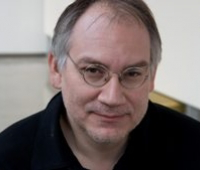
The talk offers a set of preliminary reflections on a radical theory of democracy with a double task: first, to articulate a democratic critique of political modernity and, second,
to address the postcolonial objection to eurocentrism. To carry out these two objectives, it posits the constituent power as the radical truth of popular sovereignty that is juxtaposed to the statocentric and colonial imaginary of modern politics.
Biography
Andreas Kalyvas is an Associate Professor of Politics and Chair at The New School for Social Research in New York and co-editor of Constellations: An International Journal of Critical and
Democratic Theory. He is the author of Democracy and The Politics of the
Extraordinary (Cambridge UP 2008) and the co-author of Liberal
Beginnings: Making a Republic for the Moderns (Cambridge UP, 2008). He is currently completing a book manuscript on dictatorship, republicanism, and democracy.
Memory and Narrativity (27th April)
Date and Time: Wednesday, 27 April 2016, 3.30 pm — 5.00 pm
Location: Bankstown Campus, Building 3, Meeting Room 3.G. 54
Speaker
Daniel D. Hutto
Abstract
This presentation will canvas empirical and theoretical grounds for thinking that one familiar kind of memory – autobiographical memory – depends upon the mastery and exercise of narrative capacities. It is structured as follows: Section 1 contrasts features
of utterly non-narrative forms of purely enactive and embodied remembering with that of the declarative variety required for autobiographical memory. Section 2 explicates the core tenets of the Social Interactionist Theory, SIT, of autobiographical memory, highlighting differences between weaker and
stronger formulations and the roles that the mastery of narrative practices is assumed to play in both. Section 3 addresses a challenge to SIT, exploring how it is possible to understand pure episodic remembering that apparently operates before and below the capacity to autobiographically narrate the
past. Section 4 concludes by considering arguments, motivated by empirical findings, which compel a rethink of what the primary function of autobiographical memory is in ways that speak in SIT's favour.
Biography Daniel D. Hutto is Professor of Philosophical Psychology at the University of Wollongong and member of the Australian Research Council College of Experts.
His most recent books include: Wittgenstein and the End of Philosophy (Palgrave, 2006), Folk Psychological Narratives (MIT, 2008). He is co-author of the award-winning Radicalizing Enactivism (MIT, 2013) and editor of Narrative and Understanding Persons (CUP, 2007) and Narrative and Folk Psychology (Imprint
Academic, 2009). A special yearbook, Radical Enactivism, focusing on his philosophy of intentionality, phenomenology and narrative, was published in 2006. He regularly speaks at conferences and expert meetings for anthropologists, clinical psychiatrists, educationalists, narratologists, neuroscientists
and psychologists.
Daniel D. Hutto is Professor of Philosophical Psychology at the University of Wollongong and member of the Australian Research Council College of Experts.
His most recent books include: Wittgenstein and the End of Philosophy (Palgrave, 2006), Folk Psychological Narratives (MIT, 2008). He is co-author of the award-winning Radicalizing Enactivism (MIT, 2013) and editor of Narrative and Understanding Persons (CUP, 2007) and Narrative and Folk Psychology (Imprint
Academic, 2009). A special yearbook, Radical Enactivism, focusing on his philosophy of intentionality, phenomenology and narrative, was published in 2006. He regularly speaks at conferences and expert meetings for anthropologists, clinical psychiatrists, educationalists, narratologists, neuroscientists
and psychologists.
Property, Use and Value in Hegel's Philosophy of Right (23rd March)
Date and Time: Wednesday 23 March 2016, 3.30 pm - 5.00 pm
Location: Bankstown Campus, Building 3, Meeting Room 3.G. 54
Speaker
Stephen Houlgate (University of Warwick)
Abstract
Hegel is aware that
it is only in the modern world, with the emergence of civil society, that 'the freedom of property has been recognised here and there as a principle' (PR § 62R). Nonetheless, he contends, property is made necessary by the very idea of freedom itself. The purpose of this essay is to explain why this is
the case by tracing the logic that leads in Hegel's Philosophy of Right from freedom, through right, to property and its use. I conclude by briefly comparing Hegel and Marx on the topic of 'value'.
Biography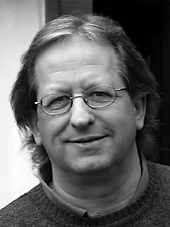 Stephen Houlgate is professor of philosophy at the University of Warwick. He is the author of Hegel, Nietzsche and the Criticism of Metaphysics (1986), An Introduction to Hegel: Freedom, Truth and History (1991, 2nd ed. 2005), The Opening of Hegel's Logic (2006) and Hegel's Phenomenology of Spirit
(2013), and he has also published numerous articles on Hegel, as well as on Kant, Schiller, Schelling, Nietzsche, Derrida, Danto, Rawls, Brandom and McDowell. He is the editor of Hegel and the Philosophy of Nature and The Hegel Reader (both 1998), Hegel and the Arts (2007) and G.W.F. Hegel: Elements
of the Philosophy of Right (2008), and co-editor with Michael Baur of A Companion to Hegel (2011). He served as Vice-president and President of the Hegel Society of America and was editor of the Bulletin of the Hegel Society of Great Britain from 1998 to 2006. He is currently President of the Hegel Society
of Great Britain.
Stephen Houlgate is professor of philosophy at the University of Warwick. He is the author of Hegel, Nietzsche and the Criticism of Metaphysics (1986), An Introduction to Hegel: Freedom, Truth and History (1991, 2nd ed. 2005), The Opening of Hegel's Logic (2006) and Hegel's Phenomenology of Spirit
(2013), and he has also published numerous articles on Hegel, as well as on Kant, Schiller, Schelling, Nietzsche, Derrida, Danto, Rawls, Brandom and McDowell. He is the editor of Hegel and the Philosophy of Nature and The Hegel Reader (both 1998), Hegel and the Arts (2007) and G.W.F. Hegel: Elements
of the Philosophy of Right (2008), and co-editor with Michael Baur of A Companion to Hegel (2011). He served as Vice-president and President of the Hegel Society of America and was editor of the Bulletin of the Hegel Society of Great Britain from 1998 to 2006. He is currently President of the Hegel Society
of Great Britain.
RSVP
s.achilles@westernsydney.edu.au<mailto:s.achilles@westernsydney.edu.au
Freedom and Distributive Justice. Perspectives from German Idealism (24th February)
Date and Time: Wednesday 24 February 2016
Location: Bankstown Campus, Building 3, Meeting Room 3.G.27
Speaker
Douglas Moggach
Abstract
This paper is an examination of the principles of natural law in Leibniz, and their subsequent reinterpretation by Leibnizians and Kantians in the eighteenth century. Of particular interest is the relation between the right of freedom or spontaneity, on the one hand, and
on the other, the principles of distributive justice as conditioning or as conditioned by the exercise of this right. The possibility of a post-Kantian perfectionism, escaping the strictures of Kant's critiques of his precursors, will be explored.
Biography
Douglas Moggach is a professor of political science and philosophy at the University of Ottawa. A recipient of a Woodrow Wilson Fellowship, he has held visiting appointments at Clare Hall; King's College, Cambridge; the University of Toronto; and the Scuola Normale Superiore
di Pisa. He is the author of The Philosophy and Politics of Bruno Bauer.
Mobile options:

